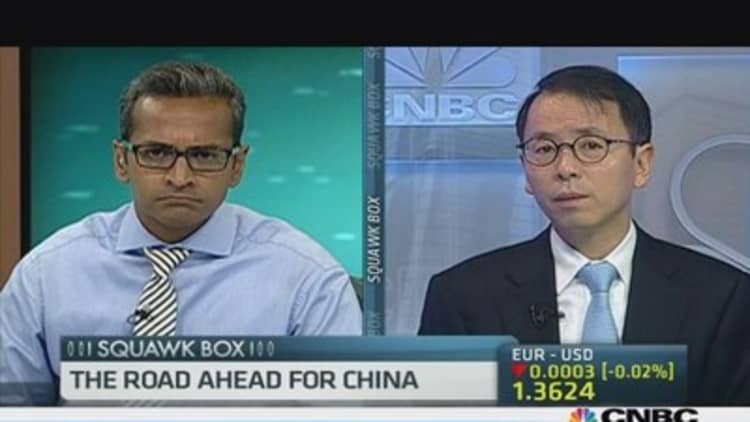
Steps to curb shadow banking in China are a positive sign, but a sharp rise in non-performing loans remains a key risk to the world's second biggest economy, independent economist Andy Xie told CNBC.
China on Monday unveiled new guidelines to strengthen the regulation of risky off-balance sheet lending in a bid to address the growing financial risks associated with a sharp rise in debt.
(Read more: China issues fresh curbs on shadow banking)
Asked to put a number on the extent of non-performing loans in the shadow banking sector, Xie said: "Non-performing assets will probably be in the double-digit range in China. In 1998, it was at 40 percent, it's not going to go to 40 percent this time but double-digits are very likely."
"The trust industry alone is like 10 trillion renminbi ($1.65 trillion), that industry is in deep trouble and it's where most non-performing assets will come from," he told CNBC Asia's "Squawk Box."
Bad loans held by Chinese banks rose by the largest amount in eight years in the third quarter of 2013, the China Banking Regulatory Commission was reported saying in November.
China's state auditor said in a report last month that local governments owe almost $3 trillion in outstanding debt, news that some analysts said was alarming.
(Read more: China's $3 trillion local government debt stirs alarm)
Economists say that the large pile of local government debt is one of the biggest threats facing China's economy. There are also concerns that a large part of the debt cannot be repaid as most of the money borrowed had funded non-profitable projects.
The prospect of defaults has also stoked concerns that Chinese banks will be left with a bad debt pile that threatens financial stability.
"As China develops from what was an agricultural society into an industrial society into a consumer-driven society, then products such as financial services will become more attractive," Jim McCafferty, managing director and co-head equity research at CIMB Securities, told CNBC on Monday.
"So there is demand [for banks] there from a top down point of view, but what is concerning the market is the amount of bad debt and the fact that a lot of local authorities have borrowed heavily from projects that may not yield positive results," he said.
(Read more: New year, new woes for China stocks)
Xie said a financial crisis in China would have "significant impact" on international markets.
"I have been bearish on industrial commodities for some time and on commodity currencies such as the Australian dollar and that will remain the case in 2014," he said.
"China is beginning to deal with its financial problems, how fast we don't know," he added. It's a good thing; if they wait any longer the mess will get bigger."
— By CNBC.Com's Dhara Ranasinghe; Follow her on Twitter @DharaCNBC


